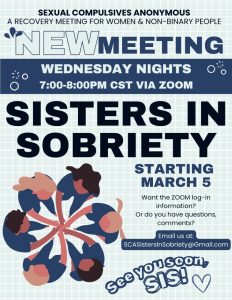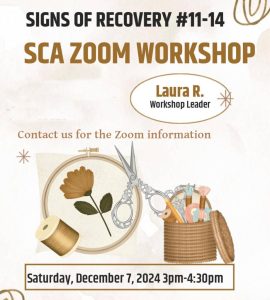Every once in awhile I need to look back and see where I have come from. By telling my story, not only do I realize that I have come far, but I also realize how cunning and baffling, the addiction is. By remembering how unmanageable my life was, it makes me work the program even more.
The day I began having sex with men was the day I became an addict. I started having sex when I was 15 and from that time until 7 years ago I wanted sex more than anything. My first encounter was with a neighborhood boy who everyone new was a “fag”. Right after that encounter I quickly sought out 2 neighborhood boys for mutual sex. At 16 I discovered cruising. In no time I was having sex with guys that I would meet in the bathroom. It did not matter what they looked like as long as I was sexually satisfied.
I learned very quickly where the other cruising places were . I started lying to my folks about working late at a fast food place, so that I could go cruise. Every spare moment I had was dedicated to having sex with as many different people as I could. When I graduated high school, I went away to college and that was heaven.
I now was in a city where I could be me. It took me less than an hour to find the cruising street. I knew I was meant to be gay since God had given me the gift of finding the place to pick up people. I entered into a relationship with someone and yet I had to cruise. My schoolwork began to suffer, but I blamed it on other people.
Then just before Halloween, I ended up being seduced by a young woman who was drunk. I could not believe the person I had become. The person, who I was dating, broke off the relationship because I was sleeping around. In the midst of the chaos of that year, I attempted suicide. I had to leave school, but again I blamed everything on other people.
Once back home, I began to cruise again and this time I was old enough to go to the bars. I discovered the wonderful life of the backrooms in the bars as well as the bathhouses. My appetite for sex grew and I thought it was normal. I believed that to be gay in the early 70’s meant having sex and lots of it. I mean what else could gay mean other than wanting to have sex with a guy. I continued to cruise even though I was arrested in a parking lot for having sex with a guy. I was lucky in the sense that I was given a warning. The undercover cops told me that they did not want to see me there again. The next week I found another place to cruise.
About a year later, sometime in the early part of 1973, I realized that
the life I was living was not what I wanted. I truly hated my life and knew that I had to change. And so change I did, I decided that since I did not like being a slut, then I should be straight. I decided to go straight. Well that lasted about 6 months. I became so irritable, short tempered, a real “bitch”. One day my sister asked what was up. I told her that I had gone straight and she laughed. She told me that I could not be something I wasn’t. She was right, I was gay and I needed to full accept it. Well it was gay pride day in NY when I went to my closest friends and told them that their “sister” was back and with a vengeance. I also decided that if I was going to be gay, I was going all the way which meant having even more sex more often. I began to have multiple anonymous encounters every day. The more I had a day, the more I thought I was being gay. Again in spite of getting a ticket for loitering and seeing my friend arrested I continued to cruise.
A year later I met someone and entered into my first long relationship. He was a wonderful person and yet I thought him strange, since he did not want to have sex with me right away. He explained that he wanted to love me for who I was and not for what I did in bed. In spite of this relationship I continued to have sex with other guys. My boyfriend even knew I was cheating and told me “I understand”. I found that funny at the time since I did not understand. Again I knew that something was not right but I could not put my finger on it. I decided to end the relationship (which was the hardest thing I’ve ever had to do) and I entered the seminary. I thought that the answer was becoming a missionary priest.
Well I had to go back to college to study philosophy and I found a school that was at least 50% gay and no one being celibate. I figured well I would eventually get the hang of celibacy, but for now it was okay to have sex. The number of partners dropped considerably, from several in one day to several in a week but it did not stop completely. When I finished my philosophy studies it was time to take a year out in preparation of taking my vows. The year was meant to be one of prayer, contemplation and spirituality. Well for me it was also a year of continued sex.
At the end of the year, it was time for me to take my vows. When the ceremony was over, the priest who took my vows realized that I looked puzzled. He asked me what the problem was and I said that I was expecting a change; I thought that I would be different and I wasn’t. Well I was off to graduate school to get my degree in theology and to a new city. I was hoping for a new beginning, but the old behaviors were still there. After my first year, I went away to the jungles of New Guinea for a pastoral year. Again I figured, that this would change things. Things did change for about 9 months. I ended up sleeping with a young man there and soon there were drawings of a man wearing glasses with his privates showing. I knew that it could not be me. How truly blind I was. I returned back to the states and decided that I should tell my superiors that I was gay. I thought that if they knew I was gay, they would surly kick me out. I was wrong and three years later I was took my vows for life and was ordained a deacon. Again, I thought that the skies should have opened up when I took my vows. I was ordained a priest 7 months later and on the night of my ordination, I slept with someone. I told myself that it was okay, since I knew the person. I’d been having sex with this person on and off for six years, ever since he was a high school senior. The next day I celebrated my first mass and still I felt no change. I was still the same person as I was before. Nothing had changed.
I started classes at a local university for a master’s degree in Chemistry. It took me less than a day to find the cruising places. I soon had to withdraw from graduate school before I was kicked out. I was off to the Philippines and a new start. The school I was to teach at was right in the middle of the “red light” district. On the one side there were female prostitutes, the other side there were drag queens looking for straight men and on the third side were male hustlers. I was glad that I was being sent away for six months of language school on another island. I figured if I could get the right start, things would be different.
While at language school, I was given a language buddy to help me when I was away from school. He was to be my translator and teacher when not at school. Well after being with him one day we were in bed together. I also ran across a birthday beach party one night. All the guys were gay and by the time the night was over, I had sex with all of them.
Back at the university, I began visiting a gay bar about 2 blocks from the school. The purpose of the gay bar was to watch dancers and then select one that you would have sex with. It was not a place to meet other gay men. I would go there to pay a dancer to have sex with. Also right near the gay bar was the pick up spot. At least 3 times a week I was out looking for and paying for sex. My life was so out of control that I truly believed that no one knew who was at the gay bar or on the cruising street, in spite of the fact that I celebrated mass three blocks away every Saturday and Sunday evening, and close to 2000 people attended mass. I truly believed that no one knew I was a priest. There were of course a few people who knew I was a priest, mainly the college guys who worked at the church. They would need money on occasion and I would give it to them in exchange for sexual favors. My life was spinning more and more out of control.
I began to get involved with a renewal program among businessmen and women. I thought that maybe joining this group, the crazy behavior would stop. I was even “baptized in the spirit”. The crazy behavior did stop, but only for 4 days. Things were getting worse. I picked up a hustler one night and 2 months later he demanded more money. I began to pay him off, but soon it was too much for me. Out of desperation I told my superior and we both sought out lawyers. While it might have been somewhat acceptable for a priest to hire a female prostitute, it was totally unacceptable for a priest to hire a male prostitute, and the hustler I had knew this. Both lawyers suggested that I leave the country for a period of time. I quickly packed everything but left the city thinking that I would return. I flew on to the capital city and had to wait there until the appropriate papers where filed so that I could return. Again I could not control the crazy behavior and was soon cruising a local mall and acting out. About two days before I was scheduled to leave the lights came on.
I remembered a conference that I had attended 9 years earlier on sexual addiction and I also remembered word for word a questionnaire that I read in which at the time I answered no to every question. Now I was answering yes and it scared me. I arrived in San Francisco and went to my parent’s home. I told them that I was sick and needed help. I called my superior in Chicago and told him that I needed to fly to Chicago right away and see him. He suggested that I take a week or two and just relax and have a vacation. I told him that a vacation was not what I needed. I told him I needed help and that I was an addict and could not stop. I was booked on the first flight to Chicago the next morning. When I arrived in Chicago I opened up completely. I now knew what the problem was. I was a sex addict. My superior told me that there was a treatment center in St. Louis that I could go to. I was also told that a priest from my religious community was scheduled to go to the center, but he could not get out of the Philippines. There was a ticket for me to St. Louis and a place at the treatment center. I flew to St. Louis and knew that I was on the right road. That was a week before Thanksgiving Day in 1992. A week later I attended my first SCA meeting and again I knew this was the place for me.
I wrote my bottom line in January of 1993 and have been true to it ever sense. When I left the treatment center in St. Louis I moved to Chicago and was blessed again for there was a growing SCA community in Chicago. After 2 years of aftercare, I chose to ask for a leave of absence from my religious community. I was able to make the request, because I had surrounded myself with a rainbow of support, a good sponsor, good friends in recovery, good friends outside of recovery and a loving religious community. A year later I had to make a very tough decision. Again being blessed with a nurturing support group, I decided to leave the priesthood permanently.
Since being in recovery, I have come to believe in the promises. The promises do indeed come true. My life is a testament to the promises. I have job, in which I love and am appreciated. I have a family that has for the most part accepted not only my being gay, but also has accepted the man I have been dating for almost a year now. I am in a loving relationship with a man, who loves me the way I am and who wants to make the relationship permanent. Of course now that I am in a relationship, my addiction has put on a new face. While my addiction took the form of anonymous sex in the beginning, it now has now taken on a new form in my relationship. I find myself being compulsive in my relationship. This disease, this addiction is indeed very cunning. As I stated, the promises do come true, but not without a price. I have had to work for my recovery. Doing the steps, reading literature, making calls, going to meetings, meditating and doing service has caused the promises to come true in my life. I’ve also had to stay away from people, places and things that were harmful to me. I’ve had to say goodbye to friends who would keep me in the addiction, bye to places that were slippery for me. But the goodbyes were worth it, for I have gained something very precious, my life.




